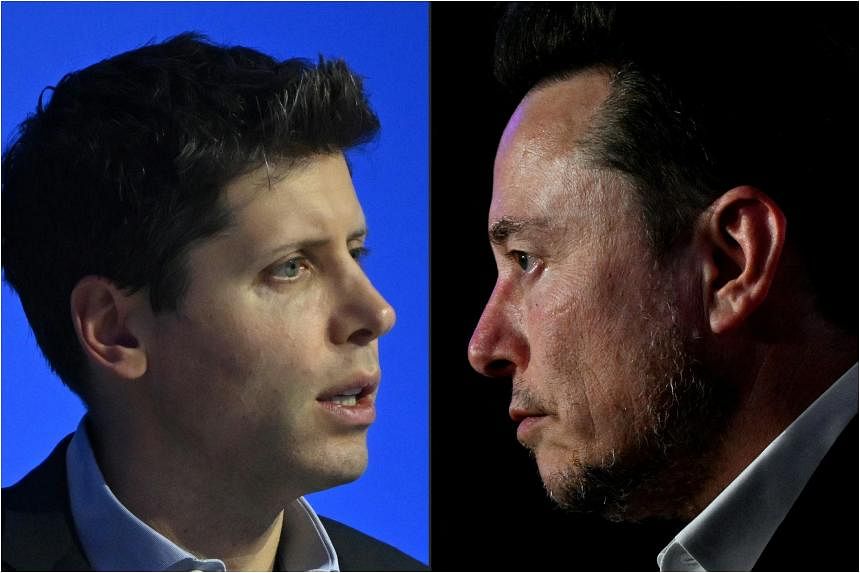NEW YORK – From Silicon Valley to Wall Street and Washington, the blockbuster case that Mr Elon Musk filed last week against ChatGPT maker OpenAI and its chief executive Sam Altman has become Topic A. It is the business world’s hottest soap opera.
But among lawyers, the case has become something of a fascination for a different reason: It poses a series of unique and unusual legal questions without clear precedent.
It remains unclear what would constitute “winning” in a case like this, given that it appears to have been brought out of Mr Musk’s own personal frustration and philosophical differences with OpenAI, a company he helped found and then left.
The lawsuit pits one of the wealthiest men in the world against the most advanced artificial intelligence (AI) company in the world, backed by Microsoft, one of the world’s most valuable companies.
It argues that OpenAI, a non-profit organisation that created a for-profit subsidiary in 2019, breached a contract to operate in the public interest and violated its duties by diverting from its founding purpose of benefiting humanity.
Mr Musk’s lawyers want the court to force OpenAI to open its technology to others and to stop licensing it to Microsoft, which has invested billions in its partnership with the start-up.
Among the questions that lawyers and scholars are asking after poring through Mr Musk’s 35-page complaint:
Does Musk even have standing to sue?
“One of the differences with non-profits compared with other companies is that, generally, no one other than the state attorney-general has standing to sue for the kind of stuff that he’s complaining about, like not following your mission,” law professor Peter Molk, at the University of Florida, said of Mr Musk’s lawsuit.
That is most likely why Mr Musk’s lawyers are presenting the case as a breach of contract instead of attacking the company’s non-profit status.
Mr Musk also alleges that OpenAI has breached its fiduciary duty, but that charge has its own challenges, lawyers said, given that such claims are traditionally handled in Delaware, not California, where the lawsuit was filed. (Mr Musk, of course, has an infamously rocky relationship with the state of Delaware.)
Was there actually a contract to breach?
The lawsuit puts forth a sprawling agreement that is made up of conversations and documents, and that makes it harder to show whether there was a binding contract – and what it might have involved.
What was required of OpenAI?
Harvard law professor Noah Feldman, who advised the AI company Anthropic on its corporate governance structure, said the contract Mr Musk claims OpenAI and Mr Altman breached contains “a hole you can drive a truck through”.
OpenAI’s certificate of incorporation, which Mr Musk’s lawyers claim is part of the deal, says the AI maker will seek to open its work to the public for its benefit “when applicable” – and OpenAI can easily argue that it is adhering to this term, which is vague.
Can a jury determine what constitutes “artificial general intelligence”?
The suit asks the court to determine that OpenAI’s latest AI model constitutes artificial general intelligence (AGI), or a machine that can match what the human brain can do, which would put it outside the scope of OpenAI’s licensing agreement with Microsoft.
There are no legal criteria for defining an AGI.
What would damages look like?
“The usual remedy for breach of contract – if you can quantify it – is money damages,” said corporate governance professor Eric Talley from Columbia University.
In this case, he believes the damages are easily quantifiable: the US$44 million (S$59 million) that Mr Musk put into the company.
Legal experts said the court could issue an injunction, ordering Microsoft and OpenAI to change the nature of the relationship, but it would be unlikely.
“That just sets up a multi-year babysitting relationship,” Prof Talley said.
What would happen if the case goes to trial?
OpenAI, which did not respond to a request for comment, is likely to move to have this case dismissed.
If Mr Musk’s lawyers, who declined to comment, succeed in bringing the case to trial, the discovery process could leave some of OpenAI’s internal workings exposed to wider scrutiny – though its most closely held secrets would probably be deemed privileged or kept under seal.
Whatever happens, the case shines a spotlight on a wider fight over the future of AI – a split over the responsibilities companies that develop these powerful tools should have. NYTIMES

